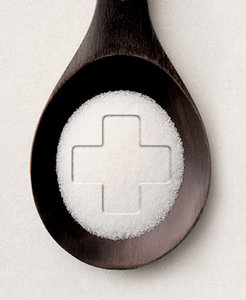The Redemption of Sugar
By Staff Editorial
Sugar - It's received a bad rap for decades, and for good reason. From tooth decay to diabetes, sugar is not a friend to a healthy diet, says an abundance of published research and clinical experience. In fact, sugar has been so successfully replaced in the American diet that you may not have even noticed its absence. It's not that we're all avoiding sweets; in fact, it's probably just the opposite. In many households and restaurants, sugar has been replaced with a wide array of "sugar substitutes" packaged in attractive pink, blue and yellow packets, stealing our attention. (Although it's important to note that not enough research has been done yet to show sugar substitutes don't have their own laundry list of health-related concerns.)
 So, back to the sugar story. Are there any redeeming qualities to this "black sheep" of the food family? Sugar actually has health benefits, but these qualities have little to do with your diet and more to do with a first-aid kit. Research suggests many of the same properties that make sugar a food preservative also make it great for healing abrasions, wounds and even burns. According to several studies, sugar's healing powers are generated from its absorption of moisture, which creates an antibacterial effect. Applying sugar to an open wound seems to reduce water activity and halt the growth of infectious bacteria. Along with this antibacterial effect, sugar also may provide damaged tissues with repairing qualities needed for healing and growth, particularly in cases of burns or ulcers.
So, back to the sugar story. Are there any redeeming qualities to this "black sheep" of the food family? Sugar actually has health benefits, but these qualities have little to do with your diet and more to do with a first-aid kit. Research suggests many of the same properties that make sugar a food preservative also make it great for healing abrasions, wounds and even burns. According to several studies, sugar's healing powers are generated from its absorption of moisture, which creates an antibacterial effect. Applying sugar to an open wound seems to reduce water activity and halt the growth of infectious bacteria. Along with this antibacterial effect, sugar also may provide damaged tissues with repairing qualities needed for healing and growth, particularly in cases of burns or ulcers. So why not give sugar a chance, albeit in moderate amounts, and not so you can load up your coffee, home-made treats and other indulgences. Instead, why not take advantage of its healing powers the next time one of your children runs through the door with a skinned knee, elbow or other minor injury? What have you got to lose? Talk to your doctor for more information.
Page printed from:
http://www.toyourhealth.com/mpacms/tyh/article.php?id=1124&no_paginate=true&no_b=true
|

